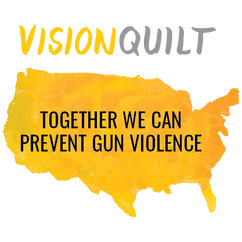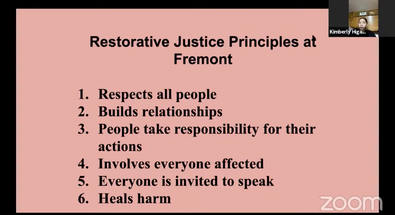 The third and last youth conference took place on December 15th 2020 on Zoom and covered the tough topic of violence and its impact on our community, and especially our youth. We see familiar faces leading this conference – talented leaders that will positively impact other lives one day – Liana Parish, Griffen Castillo, Chloe Armstead, and Jonathan Piper II. But we also get to know several new young people that leave us amazed with their resilience, sense of optimism and most importantly, their messages for us as adults. In this conference, we learn about important programs that address violence and offer a pathway towards healing and restorative justice. With a 40% increase in homicides in Oakland since 2019, after a long streak of decreased violence, these organizations are as important as ever. Joshua Rogers introduces Youth Alive, an organization that focuses on breaking the cycle of violence through prevention, intervention and healing. One of its programs is called Teens on Target (TNT) which trains high school students and young adults from neighborhoods with high levels of violence to be peer educators. They share their stories and experience with other kids and help them through their challenges. Kimberly Higareda, a Fremont High student is part of TNT and her passion for her community shows. She emphasizes the importance of giving kids the space in school to not only talk about academics, but also open the conversation to the things happening in their homes and neighborhoods. This is especially important during this pandemic, when kids are unable to interact in person with their friends. Kimberly shared a slide that lists several resources for young people in Oakland (insert slide). Valeria Ahumada from Oakland Technical High School introduces another program in the Oakland schools called Restorative Justice (RJ), a set of principles and practices used to build community, respond to harm/conflict and provide individual circles of support for students. RJ understands that conflict is a normal art of being human and focuses on building people up instead of tearing them down. This video shows the powerful impact of this program for students at Fremont High. Kenny Johnson is a victim of gun violence and plays basketball in a wheelchair. He is an awe-inspiring person who demonstrates that adversity doesn’t have to stand in the way of doing our best at all times. He motivates all attendees to keep a positive mindset during these challenging times. Staying active and being patient are his key ingredients to getting through the days and his recommendation for all of us: Never take life for granted and try to help the community. Kron 4 TV showcased his resilience. Towards the end of the conference, we hear from three adults that are active creating change in our communities. VanCedric Williams, educator and newly elected OUSD Board member representing District 3, West Oakland, Regina Jackson, CEO East Oakland Youth Development Center and Chair of Police Commission and Dr. Clifford Thompson, newly elected OUSD Board member for District 7, East Oakland. Regina’s work building bridges between the community and the Police department stands out as critical, especially in a time when police violence spans the headlines regularly in our media. She is on a mission to create a paradigm shift by helping police officers see all people as people first. Through her work with the officers, she gives community perspective around the trauma that people live through and how it shows up. She takes her focus on young people to the police and appeals to a culture of compassion first and foremost. Her big wish is that the community can trust the police again. And to end this conference, we experience a wonderful message from Oakland artists Wolf Hawk Jaguar, Santos Soul, and Dr. Lynne Morrow as they present their song from Oakland to the rest of the world: “I Love You!. Their performance says it all: I love you. Resources for Oakland youth include:
By Janine Grossmann @ Quest For You
0 Comments
Some lose control, some lose hope, Others need time to adjust. Living in confusion and trying to cope While the question burns: “When will it end and turn to dust?” We may never know the coming future Nor can we ever change the past. But let’s make the best of things as we endure For nothing is ever permanent; Nothing can forever last. Excerpt from poem titled Trying Times by May M. Phyu 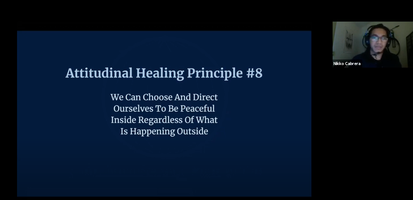 The second youth conference, just like the first one, was hosted in partnership with amazing youth leaders and a coalition of community-based organizations called the Oakland Frontline Healers (OFH). The objective of this conference was to highlight the challenges students have had with distance learning, isolation and mental health. Students expressed themselves creatively through art, poetry and the spoken word, communicating challenges such as:
However, our next generation does not stop with obstacles. They look for solutions, offer innovative ideas and effective coping mechanisms to not only get through these tough times, but also to improve our lives overall. Nikko Cabrera, a student at Oakland Tech speaks about how being part of the Attitudinal Healing Connection, a West Oakland non-profit focused on art and creativity as a means of healing, has helped build valuable life skills. AHC operates by 12 principles that serve as a guide for maintaining wellness in our daily lives. Nikko shared principle #8 with the conference attendees because he considers it extremely relevant and helpful for the current situation of isolation and uncertainty. All principles play an important role in Nikko’s life and contribute to his sense of emotional well-being. Other activities that he finds important and engages in regularly are meditation and breathing methods, which is fascinating as it is something many adults struggle finding time and focus for. I was particularly impressed and touched by this young man’s insight on the different effects of the pandemic, depending on whether one is an introvert or an extrovert. Nikko, an introvert, shares a touching example where he almost lost a friend, who, as an extrovert, needed more of Nikko’s attention and time than Nikko needed from him. He also shares some of his art work which played an important part in his healing journey from some personal difficulties. Art is a powerful tool for our young to cope with challenging times, and the adults should take note. Griffen Castillo, another voice for the youth, uses art in the form of the spoken word to express his thoughts: “but that’s the way it goes, the way life flows, a flower grows amidst the cold of its own soul again, the concrete cracks and now we’re back to where we’re from. so feel the thrum of beating drums. and know that you are worthy of the throne you seek, on which to rest your feet cuz we ain’t rest for weeks, and that don’t make you weak. so when life gets bleak find love” Youth speaker and advocate Jonathan Piper II presented critical key statistics that paint a picture on the “State of the Youth” and he calls on adult leaders, some of whom are present, to speak to the actions they are taking. In the below slide, his call to action captures vital points: The adults speaking at the end of the conference, Mr. Michael Scott, Principal of Castlemont High School, Ms. Lisa Carlisle, Director for Children and Young Adult System of Care for Alameda County, Mr. Matin Abdel-Qawi, Superintendent for all OUSD high school principals, applauded the students on their creativity, relevancy and the importance of the information they presented. They acknowledge the need to pause and listen to young people because they can clearly articulate what is needed. This second conference sends a strong message to all of us: Academics are not everything. In a critical time as we are living though now, the social and emotional needs of the students also need to be considered. And this may require more than just a laptop and a functioning Internet connection. Our youth need a lot more personal attention and care so they can thrive.
By Janine Grossmann @ Quest For You “People have the nerve to question if we should wear masks. It’s not an option; it’s a necessity. We must weave it into our daily tasks. As if breathing in others’ coughs is worth the cost.” 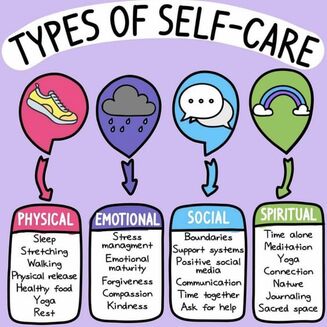 These poignant lines are part of a powerful poem written and recited by Liana Parrish, during the first of three youth conferences, held on Zoom on November 17, 2020. It was hosted in partnership with youth leaders and a Coalition of a community-based organization called the Oakland Frontline Healers. Liana is a student at Bishop O’Dowd High School in Oakland and was one of several charismatic and creative teens steering this conference with their messages on COVID awareness and resilience. And leading they did. Their message to other youth and adults was clear and direct: please take COVID seriously. When adults argue, defend, and wordsmith, our teen leaders are miles ahead of us. They know what needs to be done and they tell us, in their language, in their paintings, collages with their favorite movie characters, via written words like Liana’s poem, and even with their own music and videos:
Former Oakland High School student Chuyi Fang shares a video she made that should be shown daily on national television, it’s that good. And funny: “chin warmer” doesn’t protect against the virus. Only teenagers can say it so candidly. It is often through art that young people express their deepest concerns, and at them same time cope with them. And while the outlook of this pandemic during the time of this conference was rather grim, the messages these kids have for us is one of hope. Sariyah Shabazz, another poised student from Bishop O’Dowd, shares tips on self-care that some of us adults could really use. The first one – unexpected, yet powerful, and spot-on:
These creative young leaders and their messages demonstrate their resilience, and thereby set an example for all of us who may feel lost, hopeless, or even confused at times. They remind us, in their unique way, that while this pandemic may seem overwhelming, we all have only very little we need to do in order to stay safe. By Janine Grossmann @ Quest For You The following blog post is written by Carlos Rodriguez, a member of the Vision Quilt/Lighthouse Teen Council and our internship program. As a seventh grader at Lighthouse Charter School, Carlos completed the three-month learning expedition focused on gun violence. His piece focuses on his perspectives on gun violence, then and now. It’s pretty wonderful seeing how my mindset hasn’t really changed since seventh grade to tweflth grade. I still hold loyalty, respect, and agency as the highest values a person can have for others and themselves. These values elevate one onto a different plane from those who go around disrespecting, backstabbing, and being complacent with where they are. Although I have matured and some of my ideas are more refined, I would say that my main understanding of gun violence and how to deal with it has stayed relatively the same. When I went through the Lighthouse/Vision Quilt expedition in seventh grade, I was still pretty young and couldn’t properly express exactly how I felt about gun violence. But I still believe that the best way to improve the situation with gun violence is to have more education, and social and mental checks to whoever owns a firearm. Now I am an twelfth grader. I am more articulate, and I’m able to express myself as an educated person and a critical thinker. Although this wasn’t always the case, I feel that my experiences of gun violence, and other personal and family issues, helped me to mature at a young age.
Most of the arguments people have about gun control are caused by people being unable to see or imagine the bigger picture. This comes from ignorance and being close-minded. When I started studying gun violence in the seventh grade, I was still pretty sensitive about the topic. Although I had experienced it multiple times in my life, I didn’t really have a thick s be kin to able to deal with it. One example I can easily think of is when I used to live in West Oakland and three people were gunned down in front of the apartment complex where I lived. It was the first time I had experienced gun violence so close to where I lived. I knew that it happened in all of Oakland -- and the world -- but it had never had it happened so close to home. Gun violence is a big part of why my mom left Mexico. The majority of the people in her neighborhood have been killed or traumatized by guns. I have dealt with gun violence my entire life but now that I am a twelfth grader, I am able to process it in better and healthier ways.. A blog post written by Vision Quilt Teen Council member and youth intern Isabella Altamirano on Oakland City Hall's recent "Alternatives to the School-to-Prison Pipeline" Youth Town Hall. The town hall featured fellow Teen Council member and intern Xitlalic Castro. On Thursday, July 23rd at Oakland City Hall there was a virtual youth-led meeting. Student leaders raised questions, shared testimonies, and moderated discussions on “Alternatives to the School-to-Prison Pipeline.” The Vision Quilt Teen Council had the honor of being a part of this impressive group of young leaders with intern Xitlalic Castro to represent them. She shared the mission of Vision Quilt, which is to empower communities to create solutions to gun violence through the power of art and inclusive dialogue. Xitlalic also shared Vision Quilt’s proactive vision for alternatives to the school-to-prison pipeline:
I spoke with Xitlalic to get an understanding of what she thought about this opportunity to speak. She said it was really exciting, but nerve-racking. “Getting the chance to go to meetings to prepare and connect with the other youth speakers,” Xitlalic said, “was really great.” From this opportunity, Xitlalic has learned that it’s important to step out of your comfort zone because it’ll help you grow and get your voice out there, and having a great support system helps you to feel more prepared and less nervous. You can watch a recording of the "Alternatives to the School-to-Prison Pipeline" Youth Town Hall here. The section with Xitlalic begins at 23 minutes, 50 seconds. About the Lighthouse and Vision Quilt Curriculum For the past four years, Lighthouse and Vision Quilt have been working together starting when two of our middle school teachers created a 3-month program to study the causes and potential solutions to gun violence. They decided to have the students interact with the Oakland community by inviting Vision Quilt to help us students get our voices and the issue of gun violence out there. We did this by holding an exhibition in the month of June (the end of the program) to showcase our panels and spread awareness to the public about gun violence.
With funding from the National Writing Project (NWP)’s LRNG Innovators Challenge Grant, Lighthouse and Vision Quilt are working on a digital toolkit to share our curriculum with other teachers and schools. Stay tuned for updates! I am Yafet Aklilu and I am part of Vision Quilt’s Teen Council in Oakland, California. I attend Lighthouse Community Charter School in Oakland California, and I will be talking about what it feels like being an African American in America. As a young black man, I wonder what encounters with the police and racist people will be like. I wonder if I’ll end up another statistic along with #sayhisname. I wonder if I’ll ever be held at gunpoint for a non-legitimate reason. Lastly, I wonder if things will change in America or my future children have to worry about these same fears. America was built on systematic racism/oppression and wasn’t made for black people to succeed. I believe that black people in America face oppression and unfair treatment because of racist laws that have been implemented before and after Jim Crow. As many black Americans will tell you, being black means you're already a criminal in some police officers’ eyes. It’s sad that Martin Luther King Jr, Malcolm X, and many more black people died fighting for equal rights but systematic racism and police brutality is still a problem. For my Vision Quilt panel that I created in 7th grade (2019), my image is a picture of a black man putting his hands up and a quote from Malcolm X. The hands up sign and the quote from Malcolm X are related to police brutality. I chose the Malcolm X quote because it sends a strong message about police brutality. “If someone puts their hands on you make sure that they never put their hands on anybody else again.” The image also has years of when innocent black people were killed by cops which are also related to police brutality. The words I chose was to show the number of black people who are yearly killed by cops for no reason. I want someone to know that a lot of innocent black people are getting killed by cops for no reason. There should be stricter gun laws for the police and communities because neither cops nor community members need guns. My Vision Quilt panel means a lot to me because it sends a strong message about police brutality. We can prevent police brutality by better training and police must be randomly tested for illegal drugs. We can also prevent police brutality by regularly testing police for racial bias and banning violence usage based on their imagination of a threat. This ban would look like questioning the threat as any other civilian unless there is clear evidence they are a threat. I hope that my Vision Quilt panel can raise awareness about police brutality. I also hope that my Vision Quilt panel can impact police and people who are against police brutality.
In conclusion, not all police officers are racist or kill innocent black people, I’ve seen multiple acts of kindness from police officers towards black people. I also hope that all of the peaceful protests cause change because many black people (including me) are tired of the injustice we're still receiving. Did you know that as of August 2, there were 11,4841 confirmed cases of Covid-19 and 189 deaths in Alameda County? We want YOU to help change that! Vision Quilt is part of a county-wide initiative encouraging young people to wear masks. We’re inviting young people ages 13-24 to submit original creative works focused on encouraging youth to wear masks. The four categories for submissions are:
Youth can submit up to two submissions— once we receive your submission and evaluate it, you’ll receive a $30 Visa Gift Card! Vision Quilt will share selected submissions on social media, and we will choose one submission in each category to compete in the Alameda County Public Health Department’s All Alameda County Mask On Campaign. The winners of the County Mask On Campaign will have their work used in public messaging throughout Alameda County! Register here to participate in the contest: https://forms.gle/KJGV8AEZqPpQ7pAG6 Upon completing your registration, you must submit your piece(s) by September 10, 2020. Submissions should be emailed to [email protected] or texted to 541-690-6976. Contest Rules
Here is a powerful blog post from Samantha Pelayo, one of our Vision Quilt interns: We hope everyone is doing well during these uncertain times. Since we aren’t certain whether we are going back to school this fall, Vision Quilt provided us with art kits that keep us learning and being creative. As students at one of the schools that received the art kits, we wanted to share our experience with the art kit. My name is Samantha and my brother’s name is Lorenzo, we both attend Lighthouse Community Charter Public School. I participate in the Vision Quilt Teen Council. My brother is currently participating in the project alongside his 7th grade classmates. After completing his project, my brother reflected that the easiest part of the art kit was when he was brainstorming what his panel was going to look like. His brainstorming included what types of symbols and quotes would be best to represent the word he had chosen. The word he chose was "peace" because he thought it would be best to bring positivity to his panel, and to the idea of gun violence. The thing he enjoyed the most about this project was being able to share his message. At first, my brother was a bit confused and overwhelmed with all the papers he received, but with the help of Charlie’s video and myself, he was able to understand what he had to do in order to complete the project. My brother also stated what his most helpful resource was: “The most helpful resource was my sister because she helped me with feedback. When I didn't understand something or I was confused she would clarify it for me. Finally, she both gave me inspiration and structure for my ideas.” I believe the reason why I helped him so much was because he needed a reminder of his personal connection to gun violence. I was also present during the event he mentioned, where a man was shot by our home so I understand what he must have felt like, especially since I know him well. I believe every student should have a family member or teacher help out. This topic might be overwhelming or confusing but having someone else to be there with you helps -- especially if you are willing to share something personal you went through. Overall, this experience was fun. The best part was the art kit, getting creative, and spending time with family. Although we did run into a bit of our dark past, we are still grateful that we got to share our experience.
The schools may be closed but we remain committed to working with students in Oakland. This video features Carlos Rodriguez, one of our youth interns from the Vision Quilt/Lighthouse School Teen Council. We are grateful to have Carlos working with Vision Quilt — bringing his creativity and thoughtfulness to our team. As part of his internship, Carlos decided to create Vision Quilt panels with his sister Monserrat Morales. Carlos and Monserrat utilized the format of our Art Kits, which are designed to support socially distance at-home learning. The mini-panels from our Art Kits encourage youth to depict positive messages like hope, love, and courage. Carlos and Monserrat created two powerful panels showing their visions of family and friendship. We hope you enjoy this video from Carlos and Monserrat — stay tuned for more posts featuring our fantastic youth interns!
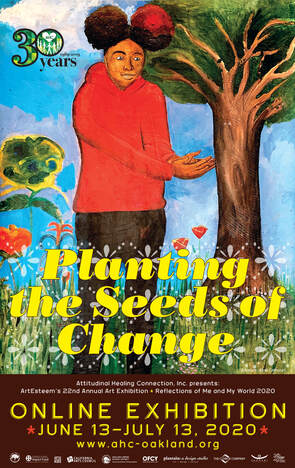 Last week our partners Attitudinal Healing Connection (AHC) launched their stunning online exhibition "Planting the Seeds of Change," featuring artwork from Oakland youth and families. Vision Quilt collaborated with ArtEsteem and the Khadafy Washington Foundation on two of the exhibition's gallery rooms. It is powerful to see Oakland youth depicting themselves as Super Heroes; Black families honoring loved ones lost to gun violence; and West Oakland Middle School youth responding to gun violence in their communities. The ArtEsteem Vision Quilt Gallery Included in AHC's online exhibition "Planting the Seeds of Change" is the ArtEsteem Vision Quilt Gallery, online now through July 13th. The ArtEsteem Vision Quilt room also features a video introduction from Kenneth Johnson, a co-teacher in the ArtEsteem Vision Quilt program. "I hope," Kenneth says to viewers, "you will be moved, transformed, and motivated as you feel the spirit of these Oakland youth. " Double-click on videos to view their contents. The virtual exhibition is best viewed on a computer or laptop. For further instructions on viewing, click here. Vision Quilt panels from West Oakland Middle School students: "Innocents Die" by Susana Calmo and "Stopping Killing Families" by Malaki Tubby. The Khadafy Washington Foundation Gallery The work in the second Vision Quilt Gallery was facilitated by Marilyn Washington Harris and the Khadafy Washington Foundation. Vision Quilt and the Khadafay Washington Foundation received grants from Oakland Unite and the Akonadi Foundation to work with gun violence survivors in West Oakland and beyond. Although our original plans were changed due to COVID-19, Marilyn Washington Harris was able to host a panel making workshop for twelve families who had lost their sons and daughters to gun violence. We are honored to work with Marilyn Washington Harris. After losing her own son, Khadafy Washington, Mrs. Marilyn dedicated her life to supporting families who had lost a loved one to gun violence. “At the time of Khadafy’s death, I realized that the city of Oakland was missing something — because I was missing something," explains Mrs. Marilyn. "Not only was I missing my son, I was missing the fact that nobody came to my rescue... So I began to do for mothers and fathers what no one had done for me. I began to reach out to help them.” At a time when our country is crying out for Black Lives, the Khadafy Gallery honors these families and their stories. Vision Quilt panel created by Anita Cole to honor her daughter Anika Crane. "Planting the Seeds of Change" exemplifies the creativity, resilience, and heartbreak that runs through Oakland. We urge you to visit the exhibition, and share it with your friends.
Vision Quilt is honored by our partnerships with AHC, the Khadafy Washington Foundation, and the youth and families creating art and telling their stories. We are grateful to our volunteers and staff supporting this work. After the conclusion of the exhibition, Vision Quilt will continue to display the panels in workshops, galleries, exhibition spaces, and through our online Virtual Quilt. Share this newsletter with friends and make a donation to support our work. As described by Andrew Vega, one of the Youth Ambassador curating the exhibition, the gallery “showcases textile art pieces created by students that express the awareness, loss, and passion that surrounds the issue of gun violence in their homes, families, and communities. |
VQ Blog
News, events and announcements from Vision Quilt Archives
July 2022
Categories
All
|
- Home
-
View Quilts & Partners
-
Virtual Quilt Across U.S.
>
- View Quilt 1
- View Quilt 2
- View Quilt 3
- View Quilt 4
- View Quilt 5
- View Quilt 6
- View Quilt 7
- View Quilt 8
- View Quilt 9
- View Quilt 10
- View Quilt 11
- View Quilt 12
- View Quilt 13
- View Quilt 14
- View Quilt 15
- View Quilt 16
- View Quilt 17
- View Quilt 18
- View Quilt 19
- View Quilt 20
- View Quilt 21
- View Quilt 22
- View Quilt 23
- View Quilt 24
- View Quilt 25
- View Quilt 26
- Marge Barrett-Mills
- West Oakland Middle School Attitudinal Healing Connection
- Lighthouse Community Charter School
- Lodestar Community Charter School
- Northwest Academy of the Arts
- Odyssey Middle School Bainbridge Island
- Youth Alive!
- Catholic Charities Peace and Justice Academy
- FACES Public Health Institute
- St. Sabina WINDOW
- Artists For Peace & Wings4Peace
- Mass Shooting Quilts
- Grandparents For Gun Safety Kansas City
- Gracie Pekrul: #Artists For Peace
- Naomi Spinak
- Khadafy Washington Survivor Project
- SF Poster Syndicate & San Quentin
- International Day to End Violence
-
Virtual Quilt Across U.S.
>
- Toolkit
- IMPACT
- Donate
- Our Vision
- Take Action
Photo from Annette Bernhardt


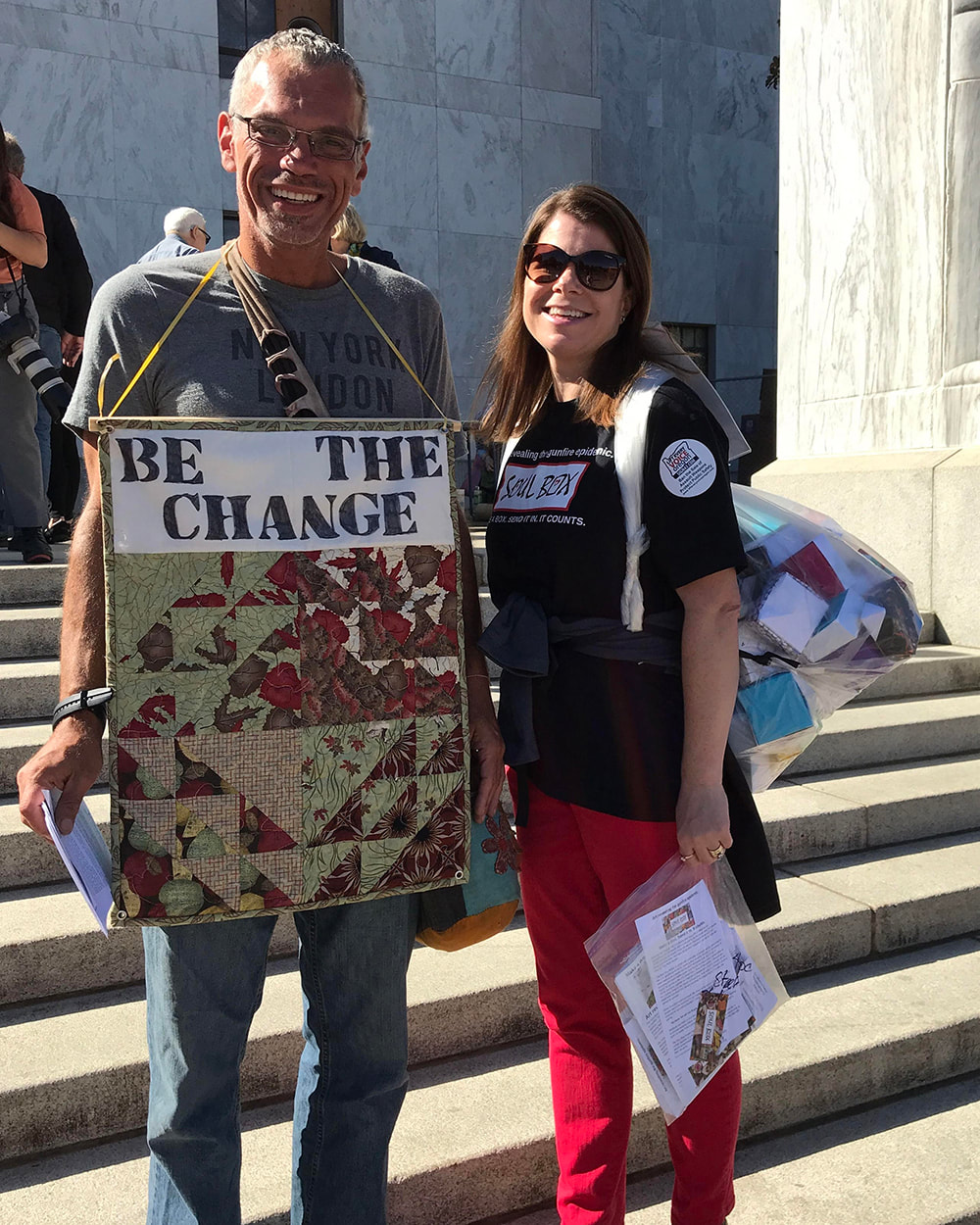
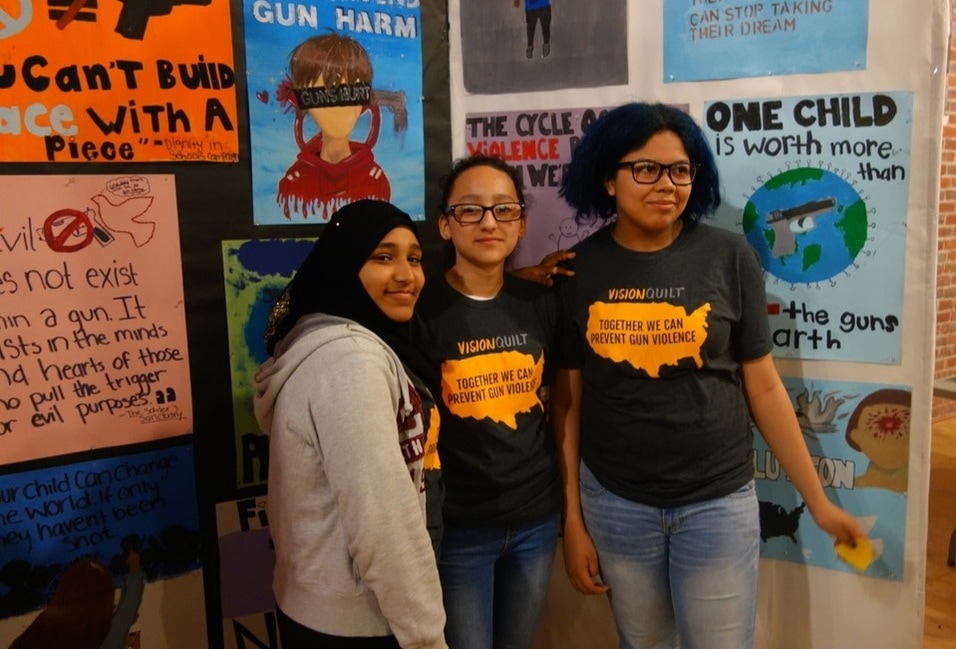
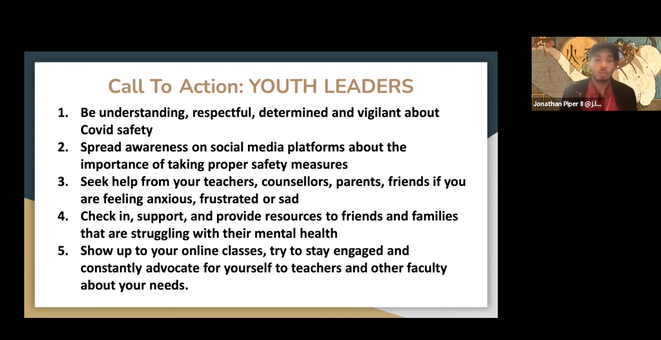
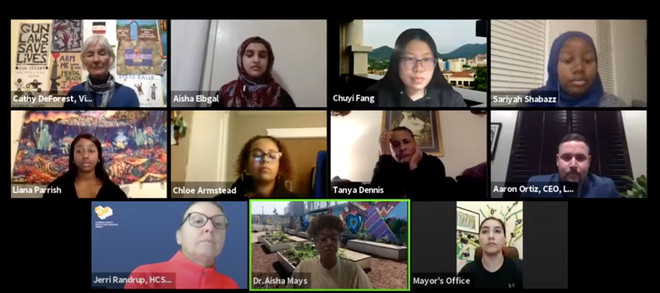
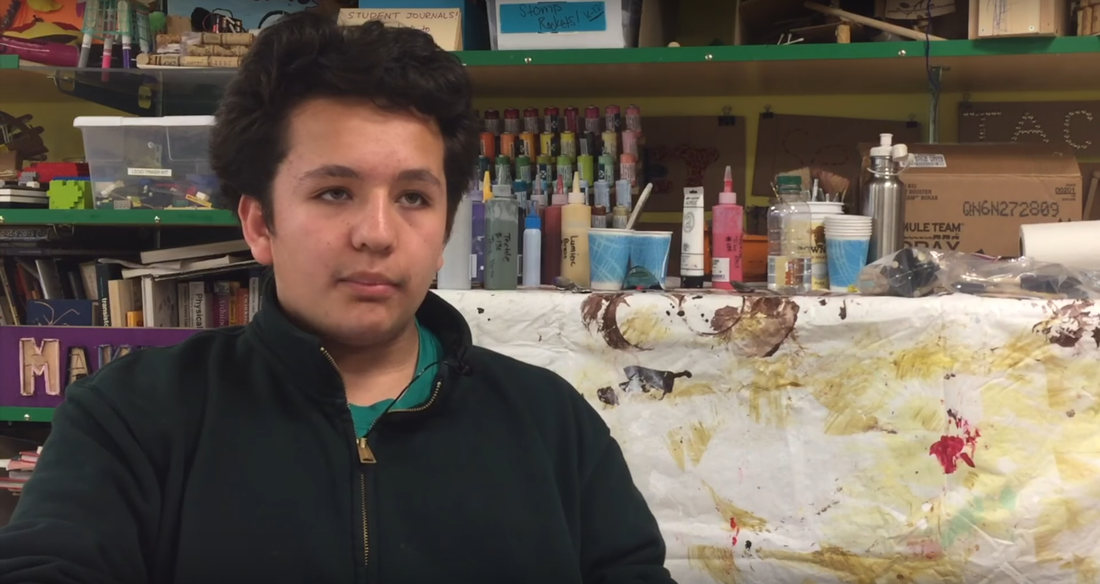
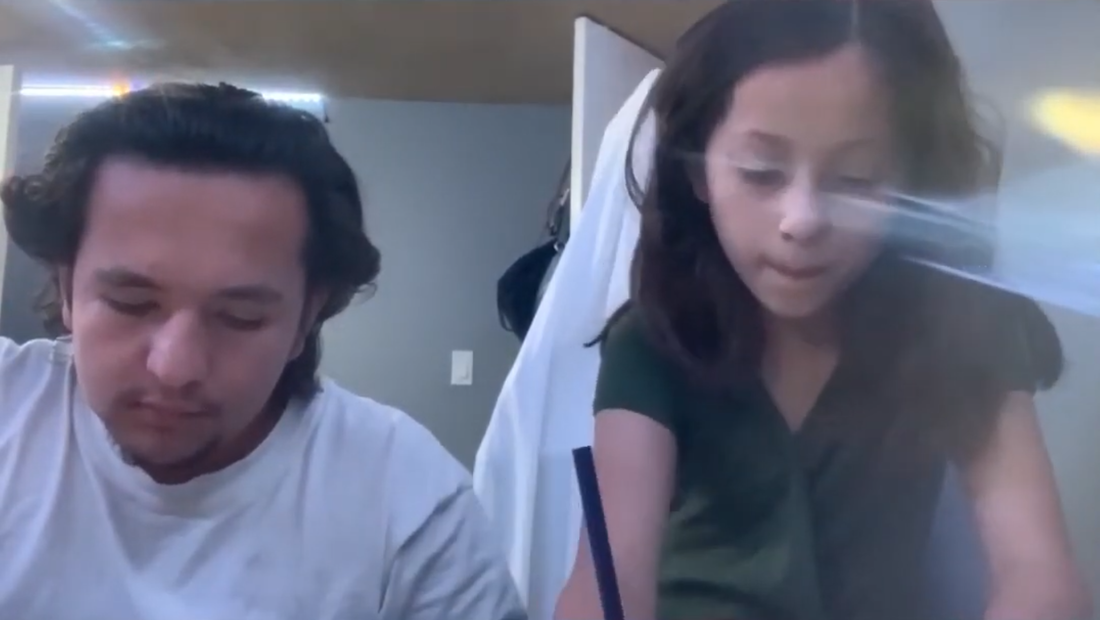
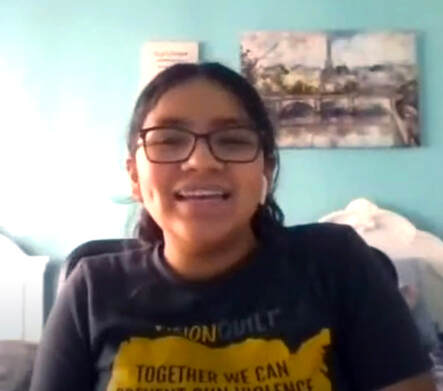
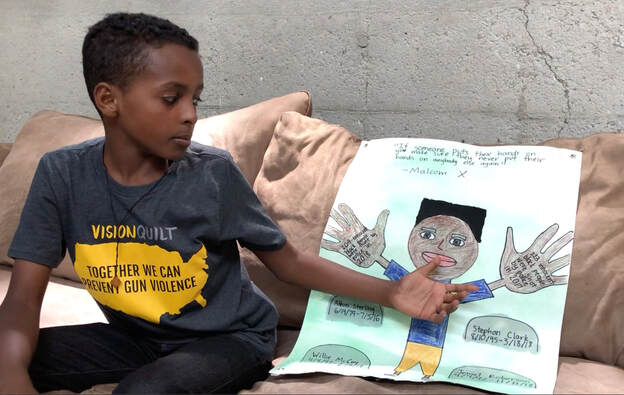
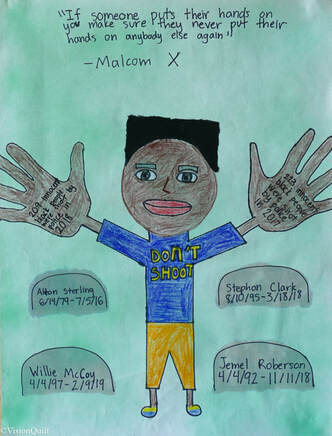
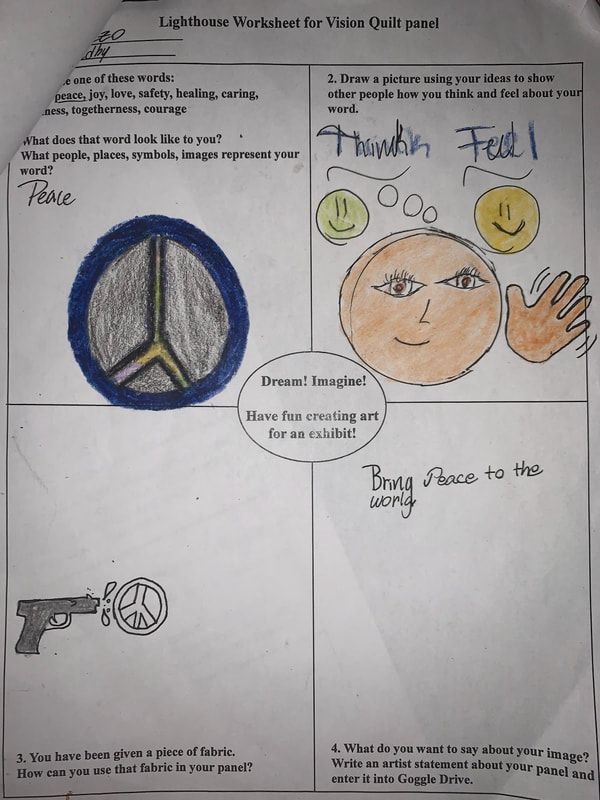
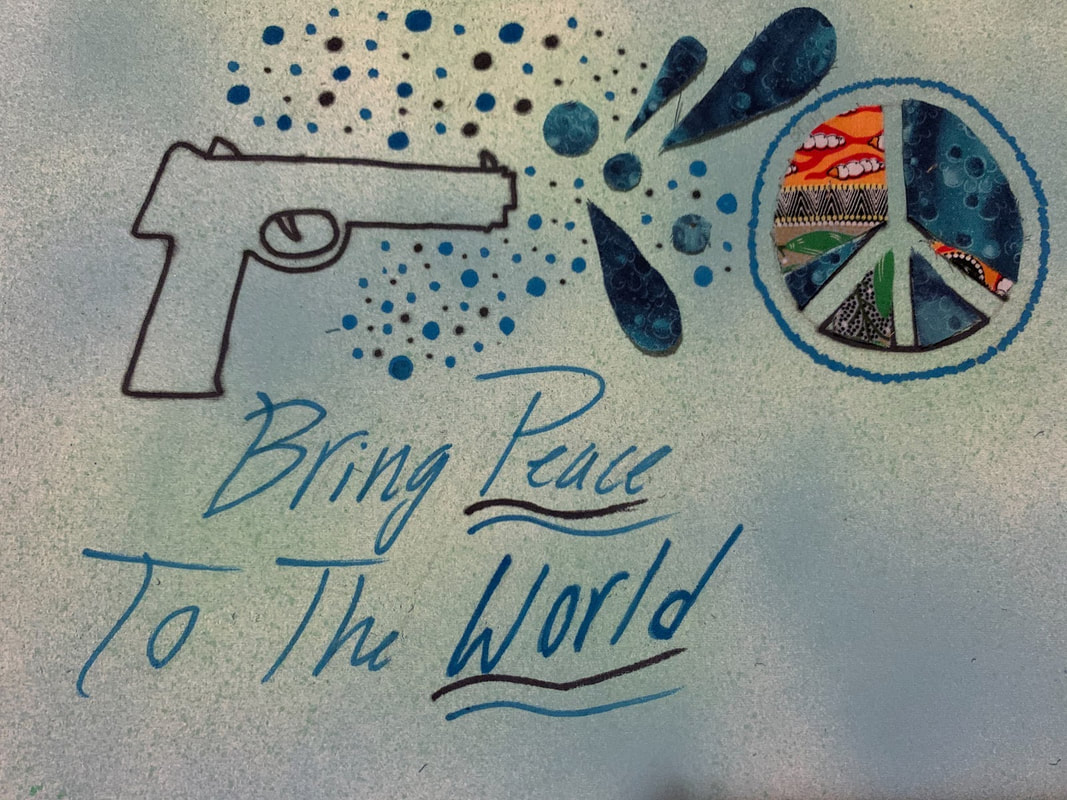
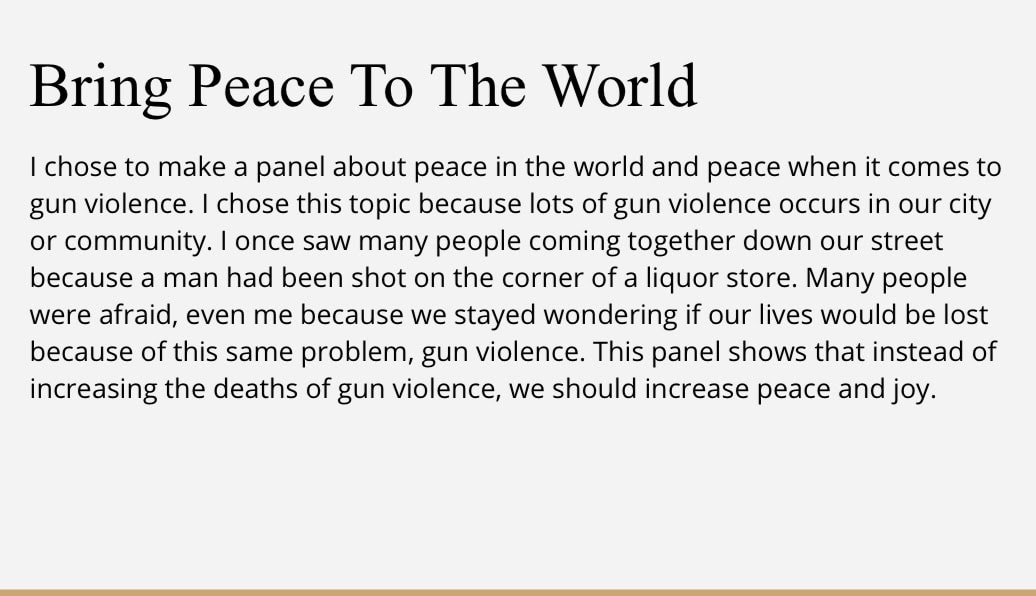
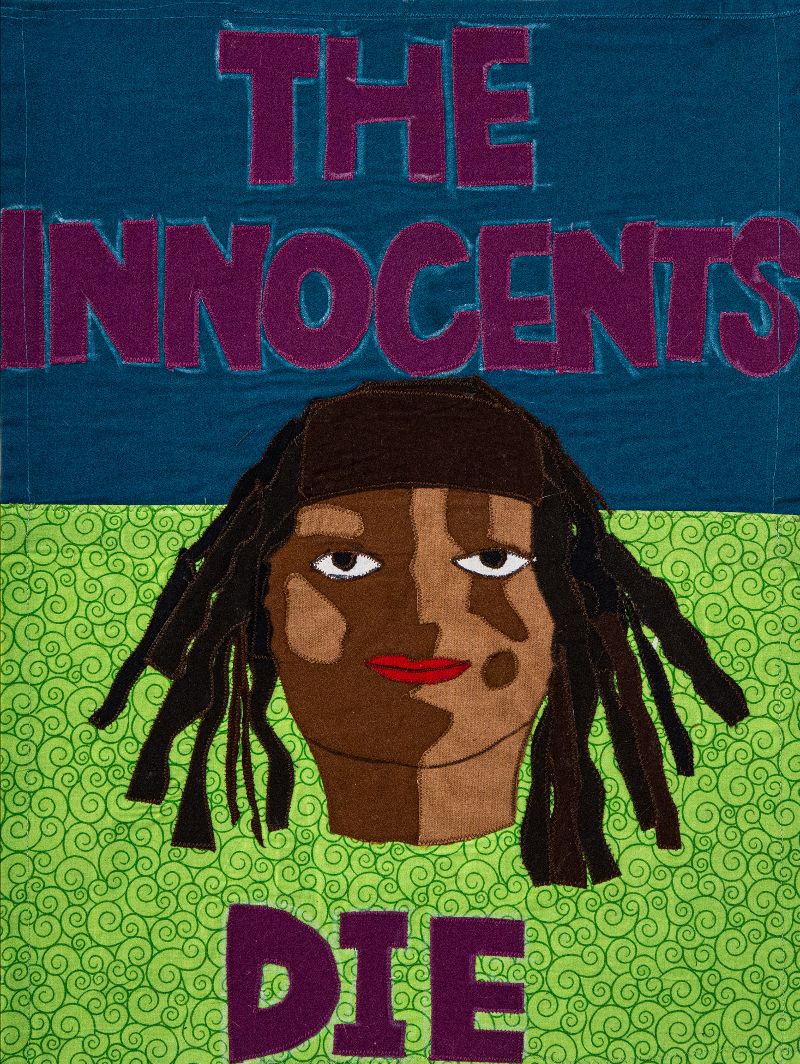
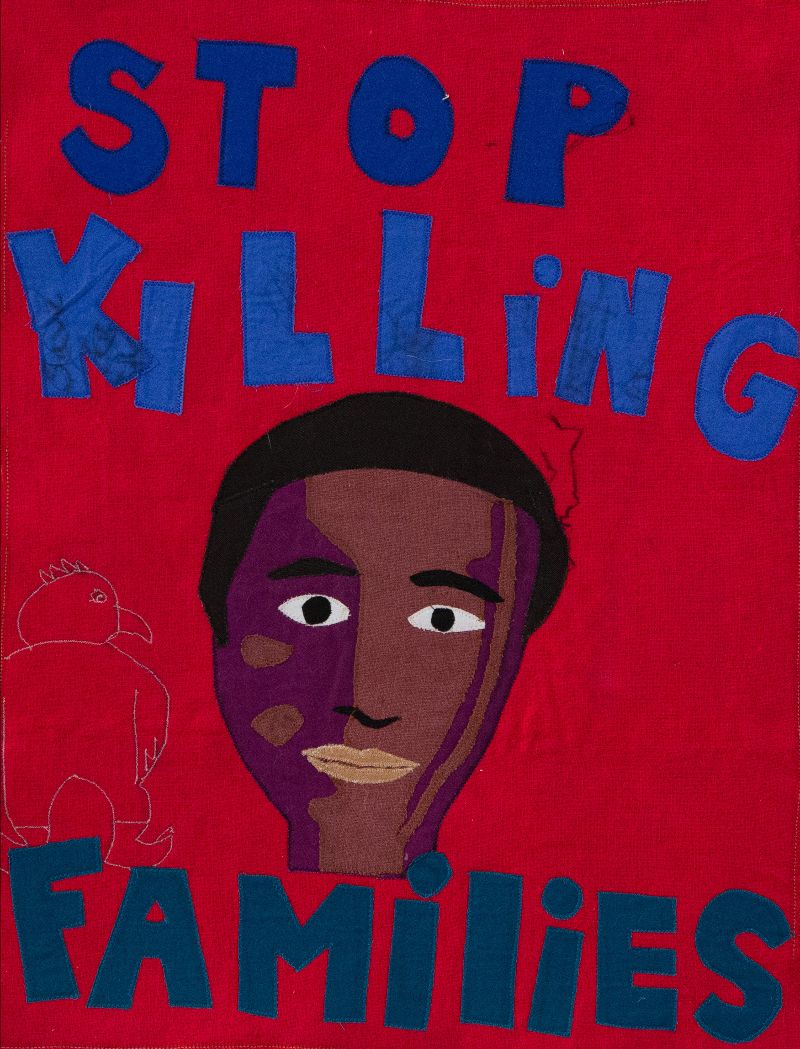
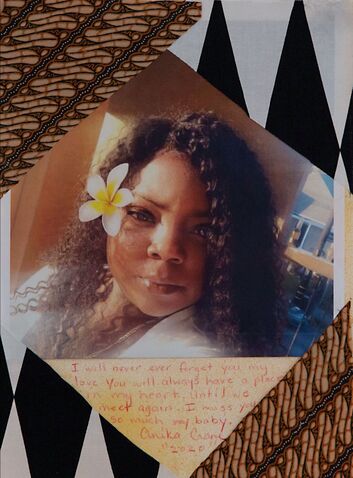
 RSS Feed
RSS Feed
